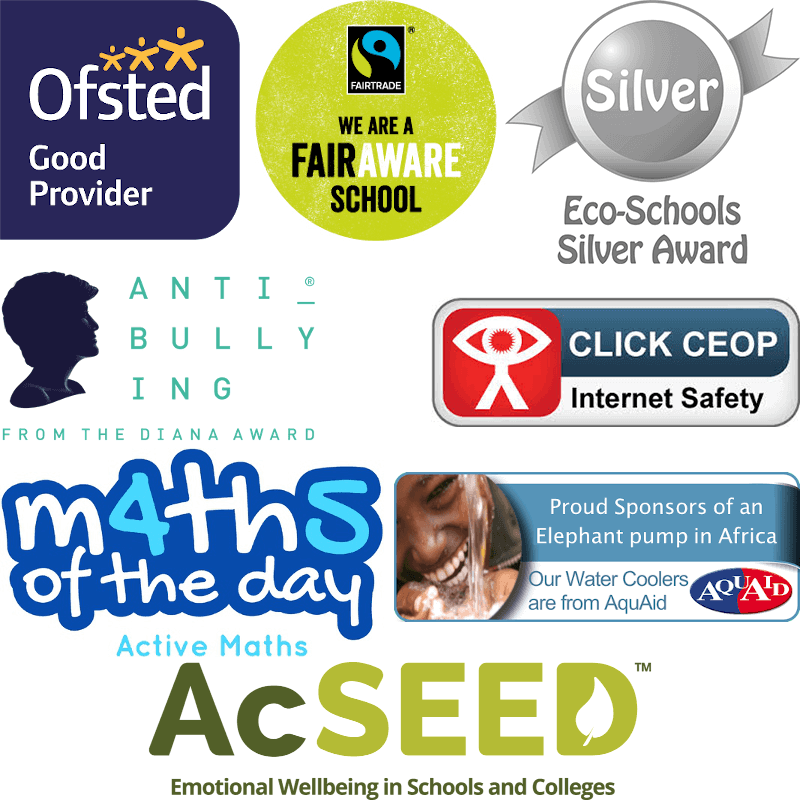PSHCE/RSE (Relationships and Sex Education)
PSHCE/RSE
Design
To enable pupils to develop the knowledge, skills and attributes they need to manage their lives, now and in the future. Our core values are to raise: Caring, respectful children with good social skills underpinned with honesty and integrity. Imaginative individuals who think critically and reflectively. Children who are masters of the basic skills in all areas of learning. Confident, independent and resilient learners for life. Pupils who are respectful of diversity and value all communities. Secure pupils in their own set of personal values and guiding principles.
We aim to foster and develop:
Resilience, confidence, independence and how to keep mentally healthy.
Pupil's enjoyment of learning about how to stay healthy and about emotional and mental health and how to build safe and positive relationships'.
Children's ability to make informed choices about healthy eating, fitness and their emotional and mental wellbeing'.
Children's personal skills, employability skills and ability to achieve academically.
Delivery
At Audlem Primary School we use MyHappymind for the basis of our PSHE and Relationships Education. MyHappymind is an award winning program for schools & nurseries, families and organisations. It teaches preventative habits that support positive mental health, resilience and self esteem. All of the concepts taught are based on science and research and grounded in neuroscience and positive psychology. The program is delivered via an innovative technology platform making learning easy, convenient and fun. It is commissioned by the NHS up and down the U.K. due to the incredible impact the program has on reducing CAMHS referrals along with the overall improvements to the wellbeing of children, staff and parents.
The MyHappymind curriculum is grounded in scientific research and helps children to:
Feel happier
Know what to do when they feel worried or stressed
Improve their focus and learn more
Achieve more of the goals that they set for themselves
Develop better relationships with friends and families
Feel great about who they are and have positive self esteem
Through My Happy Mind pupils will cover the following topics:
The PSHE Association has identified 10 key principles for effective practice in PSHE education. These are listed below and we have ensured that MyHappymind supports and reinforces all of these principles.
An emotionally friendly culture
Creating an environment that is well sign posted, therapeutic and accessible.
The MyHappymind program is aligned to a Trauma Informed approach and is for all year groups from Reception through to Year 6. The MyHappymind program recognises sensory needs, it is highly visual, positive and proactive.
Working directly with students and parents/caregivers.
The MyHappymind program provides a free app to parents and caregivers allowing them to understand what their child is learning at school. In addition, the app provides engaging activities for parents to support positive conversation and play at home. MyHappymind is delivered by the teachers not an external provider which allows for constant embedding and integration with the children.
Working directly with teachers and providing training & quality supervision.
MyHappymind offers full training and support for all staff. All sessions are recorded and made available in case of staff absence.
Facilitating group work & peer support sessions.
MyHappymind is a whole school approach and taught to all children from Early Years all the way through Year 6. The MyHappymind lessons can also be used in small groups as well as 1:1 which allows for a whole school culture and language to develop
Embedding emotional wellbeing principles within policies.
MyHappymind is a whole school approach and taught to every child in the school from nursery through to year 6. Therefore, there is ample opportunity for it to be embedded within a range of policies e.g. Emotional Health and Well Being Policy
Embedding emotional wellbeing teaching within the curriculum.
MyHappymind is taught weekly. All children in Years 1-6 receive a journal which they have with them through the program. This is a really good visual record of their learning. Parents and Carers have access to a free app which they can use at home. The app helps the parents understand what their children are being taught and supports positive conversation and play.
As well as using My Happy Mind at Audlem we also hold regular assemblies, which incorporate British Values and SMSC. The children have a wide range of opportunities to implement their learning in specialist days, events, trips, sporting activities and curriculum pledges. Ensuring that we give our children as many 'real life' learning experiences as possible.
Achievement
Children will learn how to become valued citizens and leave Audlem St James Primary School ready to embrace the next stage in their lives and learning. At all times 'being their best selves.' Children will be caring, respectful with good social skills underpinned with honesty and integrity. Imaginative individuals who think critically and reflectively. Children will be masters of the basic skills in all areas of learning. Confident, independent and resilient learners for life. Pupils will be respectful of diversity and value all communities. Secure pupils in their own set of personal values and guiding principles.
Resilience, confidence, independence and how to keep mentally healthy.
The MyHappymind approach is grounded in positive psychology and neuroscience. By teaching the science and embedding the habits around mental wellbeing we give children the understanding and tools to cope when times get hard. The children learn how to look after their brain, they look at their own character strengths which helps them with their confidence and independence and they complete a module on goal setting which increases their resilience.
Pupil's enjoyment of learning about how to stay healthy and about emotional and mental health and how to build safe and positive relationships'.
The MyHappymind approach teaches the children how to recognise when their brain is working well and when their brain is feeling stressed as well as techniques to deal with any moments of stress. There is a whole module within the MyHappymind program on building positive relationships and the core skills needed in order to do this. The MyHappymind curriculum covers all the mandatory elements of the RSE curriculum.
Children's ability to make informed choices about healthy eating, fitness and their emotional and mental wellbeing'.
The MyHappymind program gives the children the skills needed to understand their own emotions and wellbeing. Developing this emotional literacy helps them to navigate difficult situations.
Children's personal skills, employability skills and ability to achieve academically.
The MyHappymind program gives the children the ability to self regulate and to understand how their brain works. This enables them to go into situations, e.g. tests/going into school (especially after Covid) in a more calm and relaxed manner. The children learn how to self regulate, persevere, show gratitude and develop positive relationships.
PSHE
PSHE promotes the spiritual, moral, cultural, mental and physical development of pupils at the school and of society, and prepares pupils at the school for the opportunities, responsibilities and experiences of later life.
We aim to provide pupils with the knowledge, understanding, attitudes, values and skills they need in order to reach their potential as individuals, within the community and modern Britain. They reflect on their experiences and understand how they are developing personally and socially, tackling many of the spiritual, moral, social and cultural issues that are part of growing up. They learn to understand and respect our common humanity; diversity and differences so that they can go on to form the effective, fulfilling relationships that are an essential part of life and learning.
PSHE is carried out throughout the whole school day. This can be in a range of ways for example: listening to others, talk partners, sharing feelings, developing inference about characters in stories and focusing on similarities and differences. At playtimes we offer pupils a half and half playtime where they can play games, colour and enjoy a quieter social playtime.
Furthermore, pupils have approximately 1 hour of allocated to PSHE each week. In class children focus on the program MyHappymind. The children also go to assemblies that celebrate children's achievements both inside and outside of school. They also have a weekly assembly, where the theme will be based around SMSC, British Values or PHSE.
Children build their capacity to work cooperatively, behave in constructive ways, to take responsibility for not encouraging bullying and how to support victims of bullying. We also run a range of interventions that are tailored to the needs of our children. These range from Nurture Groups, Resilient Classroom Cool Connections and ELSA.
At Audlem we aim to give the children the best possible experience at school and strive help our pupils develop across all areas of school life and be the best that they can be.
Relationship and Sex Education
At Audlem we believe that the essential aim of Relationship and Sex Education should be to provide pupils with the knowledge and skills to enable them to make informed and responsible choices in later life, emphasising the benefits of a healthy lifestyle.
We believe that Relationships and Sex Education should contribute to promoting the spiritual, moral, cultural, mental and physical development of pupils at school and of society and preparing pupils for the opportunities, responsibilities and experiences of adult life.
It should be taught within a climate of trust, respect and appropriate confidentiality, in which pupils and adults feel able to talk openly and honestly. Audlem School nurtures every child to enable them to achieve beyond expectations and develop into confident individuals with a lifelong love of learning, equipped with the skills they need to thrive in a rapidly changing world.
Children need to learn about:
- Different types of relationships (e.g. friendships, family, intimate);
- recognising, understanding and building healthy relationships;
- how relationships affect health and wellbeing (including mental health);
- safety online;
RSE is taught within the personal, social, health and economic (PSHE) education curriculum. Biological aspects of RSE are taught within the science curriculum, and other aspects are included in religious education (RE).
RSE is about the emotional, social and cultural development of pupils, and involves learning about relationships, healthy lifestyles, diversity and personal identity. RSE involves a combination of sharing information, and exploring issues and values. RSE is not about the promotion of sexual activity. Pupils also receive stand-alone sex education sessions delivered by staff.
Relationships education focuses on teaching the fundamental building blocks and characteristics of positive relationships including:
- Families and people who care for me
- Caring friendships
- Respectful relationships
- Online relationships.
Our Partners


